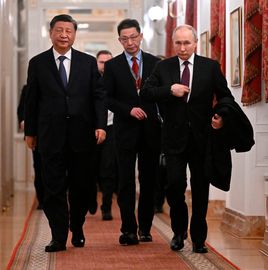It has become increasingly clear that we are facing a formidable adversary on our northern borders. China’s huge economy, brutally effective and well-equipped armed forces and recent advantages in technology make it a colossus in any case, but its aggression on the disputed Line of Actual Control (LAC) between our countries, its killing of 20 jawans in 2020 and its refusal since then to vacate areas occupied by its army that previously used to be patrolled by both sides, constitute a challenge we simply cannot afford to ignore. An added complication for us is that China’s diplomacy is making impressive headway around the world.
If China were merely a belligerent power, throwing its weight around, pushing its maritime neighbours to the limits of their territorial waters, embarking on a trade war with Australia, cracking down ruthlessly on Hong Kong and Sinkiang and threatening Taiwan, it would be easier to confront. But, instead, it has begun exercising a more subtle influence around the world, recently mediating the Saudi-Iranian agreement for normalisation of relations (which was widely seen as a diplomatic triumph for Beijing).
Together with the billions of dollars spent on worldwide infrastructure projects under its Belt and Road Initiative, this is promoting talk of a newly influential “global China”. Col Zhou Bo, now a strategist at the influential Tsinghua University, was recently quoted as saying: “Global China is definitely real. China is ubiquitous. China’s influence is everywhere.” That “everywhere” notably includes India’s close friend, defence equipment supplier and indispensable source of discounted fuel and fertiliser, Russia. Chinese President Xi Jinping’s recent visit to Russia made headline news around the world, but the media focused on the extremely unlikely outcome of Moscow agreeing to a peace deal to end the Ukraine war. That was always a red herring: it’s clear to everyone, including Beijing, that neither Russia nor Ukraine is ready for peace or even for negotiations at this time, as both believe they can “win” on the battlefield.
China was always unlikely to attempt to pull off peace during Xi’s Moscow visit. The trip was instead intended to burnish China’s international image and to shore up the two countries’ increasingly close relationship. China has long spoken of a “no-limits” friendship with Russia, and it is clear that the relationship continues to expand, with the two leaders agreeing to an important set of economic proposals, including a significant expansion of their natural gas trade. A new planned pipeline, named ‘Power of Siberia 2’, is to supply China with some 50 billion cubic meters of Russian gas annually, reaching at least 98 billion cubic meters of natural gas, in addition to 100 million tons of liquefied natural gas, by 2030. For a Russia unable to exploit its “natural” market in western Europe because of the sanctions imposed on it after the Ukraine invasion, the opportunity to supply China with its vast supplies of gas is of inestimable value. In addition, as Putin himself announced in Moscow, “Russian business is in a position to meet the growing demand from the Chinese economy both within the framework of current projects and those that are now in the process of negotiation.” Put less obliquely, Russia’s dependence on China for its own prosperity is increasing by the day. It’s a classic colonial relationship: Russia will supply resources to the new metropolitan power to the east, while importing more sophisticated Chinese technology than Russia possesses, such as computer super-servers from Huawei, in addition to all the daily consumer items no longer available from the west. There is increasing talk that the yuan [China’s renminbi] will be Russia’s main trade currency.
Where does this leave India? China is unremittingly hostile, refusing to budge an inch from its territorial gains in 2020 and continually thrusting itself into new areas along the LAC, most recently near Tawang. We have looked to Russia as a balancing power, but how useful can a Russia reduced to being a junior partner of China be to us? If our principal friend is helplessly dependent on our principal adversary, what’s the friendship worth? These are major questions to ponder as New Delhi recalibrates its geopolitical options while casting a wary eye on the irresistible rise of global China.
editor@theweek.in


